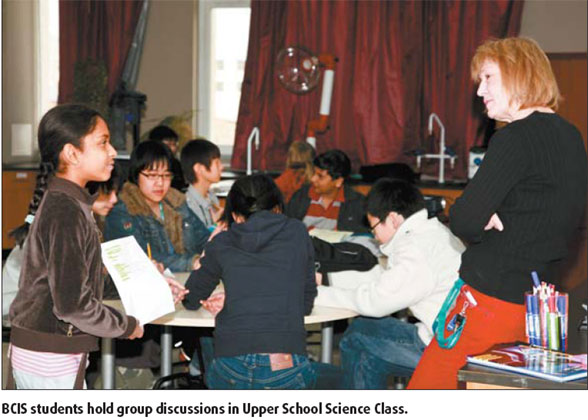Special supplement: IBDP offers unlimited career opportunities

As the international world of business, commerce, trade and treaties such as free trade agreements become ever more enmeshed, the career opportunities for internationally mobile university graduates are virtually unlimited.
What many of these graduates have in common is access to internationally reputable universities via the high school university preparation program of the International Baccalaureate, the IB Diploma Program.
The IB Diploma Program (IBDP) is recognized by more than 2,300 universities in more than 80 countries around the world. These universities are increasingly coming to recognize that the diploma has several advantages over other systems, including:
High academic expectations
A balance of subjects (including mathematics, two languages, sciences, humanities and arts)
A course in Theory of Knowledge (TOK), designed to improve critical thinking skills and self-awareness as learners
An extended essay, preparing students for the rigors of academic research at university
Community service, which enables students to apply their knowledge to real global issues
Not only do many universities prefer applicants from the IBDP, but in fact many universities grant IB Diploma graduates advance credits in several subjects. At the University of British Columbia, for example, an A or B in TOK will gain students 6 credits on an undergraduate philosophy course.
A deliberate choice
Many families are beginning to strategically place their children into the IB curriculum stream as a deliberate choice, as evidenced by the burgeoning enrollments in predominantly international schools worldwide that have the IB as their main and sometimes only curriculum offering.
In Beijing one such international school is Beijing City International School (BCIS), which is rapidly carving out for itself a formidable reputation within the expatriate community of Beijing and internationally minded Chinese mainland families.
BCIS has as its mission to educate and empower students to be compassionate and inspired people, who act for the good of all and for the sustainable development of the world. Importantly, the faculty believes that students today must have an awareness and understanding of global issues, respect and understand different cultures, service local and global communities, and live by a spirit of inspiring others, achieving one's goals and creating a better world.
Given this philosophy, it is no wonder BCIS chose to offer the IBDP for its Grades 11 and 12. The IB Diploma provides an all-round, truly international education. Students taking the diploma will become global citizens capable of communicating and interacting across and within cultures.
A good example of how this is achieved is through the Creativity, Action, Service (CAS) program that is an integral part of the IBDP. Diploma students are required to undertake a 150-hour CAS program. This provides students with wide-ranging experiences, in particular by doing community service within local communities or abroad. These experiences provide students with greater self-awareness and a better understanding of local and global issues.
Competitive advantage
In recognition of the type of students the IBDP produces, graduating with an IBDP gives students a competitive advantage over other high school leavers around the world.
In a recent survey of UK universities, conducted by the International Baccalaureate Organization (IBO), the IB Diploma scored higher than all other systems in depth, breadth, critical thinking, communication skills, self-management and motivation of students. The study also found that IB Diploma graduates are more flexible, more open to new ideas and more ready to question and challenge. They were also found to be better at critical thinking than other students.
Anthony Carman, the guidance counselor who is responsible for managing the worldwide university and college admissions program at BCIS, said:
"Universities everywhere and especially those in the highly competitive regions of the United States, Canada, the United Kingdom and Australia, welcome high school graduates of the IBDP due to their unique characteristics of experience at university level rigor in the IBDP curriculum, the community mindedness nurtured by CAS, the breadth and depth of their knowledge base, the embedded critical thinking skills as encouraged in the compulsory TOK program, the flexibility and tolerance of their personality types and their ability to thrive in environments of high ambiguity; all are characteristics highly desirable to universities anxious to ensure diversity in their campus population and improve their graduation rates."
But choosing the curriculum for your final high school years is not the only step. Given the competitive nature of universities today, it is important that students think about their university application as early as possible. According to Carman, universities generally evaluate student application packages according to high school grades, test scores performance, quality of teacher and counselor recommendations, levels of participation in school life generally as well as in specific activities and performance in other areas such as writing admission essays and possibly even interviews.
It is therefore vital that students and their families work closely with the school guidance counselor to ensure that the university application process is addressed early in the student's high school life. Generally it is recommended that students and families:
Meet with the school counselor to discuss student strengths, weaknesses, interests, and goals. Make a plan.
Meet with the school counselor well in advance of deadlines to consider subject choices, which match your child's academic strengths, interests, and future plans.
Continue to meet with the school counselor to discuss concerns about behavior, attitude, and/or academic performance.
Use the expertise of the school counselor, along with any resources in the counseling office, to assist your child to plan their post-school plans.
Seek information from the school counselor about any required standardized testing.
Attend information programs run by the counselor.
Read and follow up any information sent from the counseling office to your home.
(China Daily 05/07/2008 page24)














